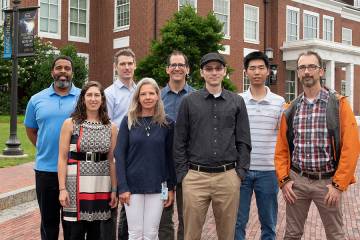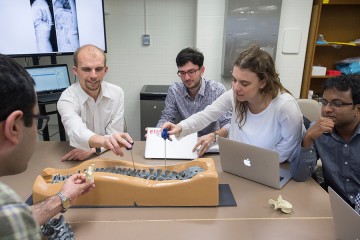- Name
- Jill Rosen
- jrosen@jhu.edu
- Office phone
- 443-997-9906
- Cell phone
- 443-547-8805
A new program will allow students to earn graduate degrees from both the Johns Hopkins University's top-ranked Department of Biomedical Engineering and the world's No. 1 engineering school, Tsinghua University in Beijing, China.
The Tsinghua JHU-BME Dual Degree MS program, the first academic collaboration between Johns Hopkins and Tsinghua University, extends the research collaboration between the two institutions that started in 2008 with the establishment of a joint Center for Biomedical Engineering Research.
During the two-year curriculum, students will study and conduct research in the U.S. and China, earning a Master of Science in Engineering in biomedical engineering from Johns Hopkins and a Master of Science degree from Tsinghua's Electronic Engineering or Biomedical Engineering departments. U.S. News & World Report ranks Tsinghua as the world's best global engineering school and ranks the Johns Hopkins Biomedical Engineering Department first among BME graduate programs.
"This partnership brings together the two best engineering programs in the world to position our students at the forefront of the rapidly expanding and dynamic medical technology innovation field," says Michael I. Miller, professor and director of Biomedical Engineering at Johns Hopkins. "The future of biomedical engineering education is global, and we are proud to partner with Tsinghua University to offer students this exciting opportunity."
Tsinghua JHU-BME program students will spend their first year at Johns Hopkins taking advanced project-based courses in either biomedical data science; regenerative and immune engineering; neuroengineering; biomedical imaging and instrumentation; genomics and systems biology; or computational medicine. They will have the opportunity to work with researchers, clinicians, and physicians at the Johns Hopkins School of Medicine and the university's Whiting School of Engineering.
The next year, the students will travel to Tsinghua to pursue a year of thesis research under the mentorship of scientists and engineers. Students will also be able to participate in summer internships with Beijing companies and hospitals.
"This provides our students with the best of both worlds," says Raimond L. Winslow, director of the Institute for Computational Medicine, and the BME department's vice chair of academic programs. "At Johns Hopkins, they receive specialized, hands-on training in emerging BME disciplines and access to one of the nation's best medical schools. At Tsinghua, they gain a global perspective of research and product development that will make them an asset for future employers. Together, these experiences give them a competitive advantage in the global marketplace."
Posted in Science+Technology
Tagged biomedical engineering









